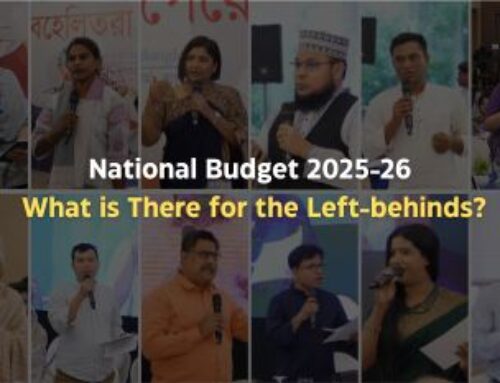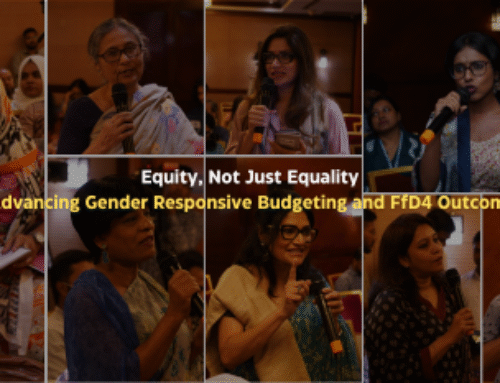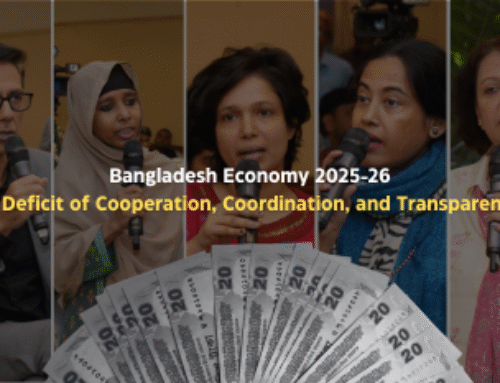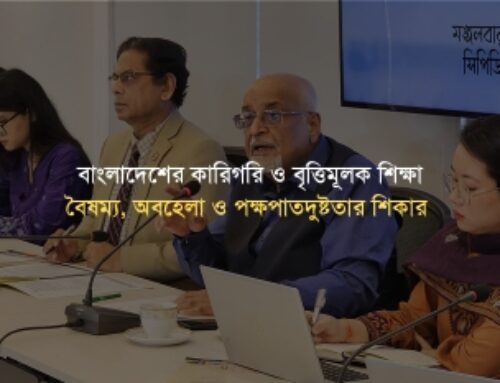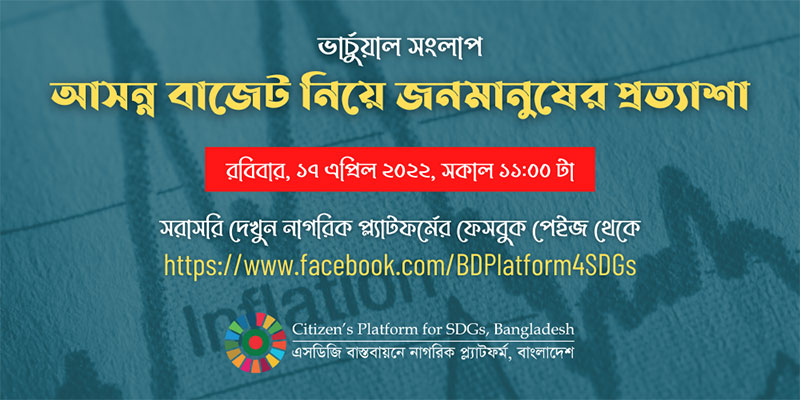
The outbreak of Covid-19 has caused both national and global repercussions. As the world was preparing to mitigate the losses, the conflict in Ukraine emerged as another shock. Bangladesh is also bearing the consequences. The prices of different commodities have soared in the domestic market of Bangladesh. Indeed, the global and national disruptions in the supply chain have caused the prices of necessary items to go up, making the daily necessities out of the reach of low and lower-middle income groups.
Citizen’s Platform for SDGs Bangladesh organised a virtual dialogue on Upcoming National Budget 2022-2023: Perspectives of the Disadvantaged Groups, held on 17 April 2022, keeping in the purview the upcoming budget. At the dialogue, representatives of the disadvantaged population groups and the partner organisations of the Citizen’s Platform shared their views and expectations on the upcoming national budget in view of the challenges faced by the disadvantaged communities at the grassroots level.
The discussants stressed the need for protecting the low and lower-middle income groups from the spiralling prices of essentials. They also highlighted that the loss caused by the pandemic in the areas of economic activities, education and health should be the priority of the upcoming national budget. To this end, the discussants suggested expanding the ongoing public programmes and introducing new initiatives. It is important that the budget clearly identifies how the budget addresses the needs of the disadvantaged population groups.
The overall public expenditure should be increased, especially in the areas of agriculture, education, employment, health and social safety net programmes. In his closing remarks, Dr Debapriya Bhattacharya, Convenor, Citizen’s Platform for SDGs, Bangladesh and Distinguished Fellow, CPD stated that the general public should have the opportunity to respond prior to the actual budget if a draft of the budget or budget policy is shared. A targeted expansionary monetary policy is now needed to boost the economy. However, taking cognisance of the current revenue mobilisation and public expenditure situation, the goal should be to provide direct financial assistance and food aid to the disadvantaged people in particular. To this end, the preparation of an inclusive data set for the incentives provided is necessary to ensure accountability.
Proper child budget analysis is needed as nine ministries are engaged in child protection, ensuring quality education, nutrition benefits, said Mr Tony Michael Gomes, Director- Technical Program, Advocacy and Communications, World Vision Bangladesh. At least 10 per cent of the budget should be allocated for children in a separate line item at the union and upazila level. He also stressed that children who are more at risk of dropping out of school should be provided more fiscal incentives in the next budget.
Mr Khandekar Jahurul Alam, Executive Director, Centre for Services and Information on Disability (CSID) specified that education, health and employment are the three areas where persons with disabilities have been most affected. He informed that more than 40,000 children with disabilities dropped out during the pandemic.
Mr Shakeb Nabi, Country Representative, Cordaid, highlighted that the majority of the small and marginalised farmers are in the informal sector. They are deprived of their rights, and they need to be shifted towards the formal sector. While allocating budget, decentralised and community-based agriculture should be focused along with the entire value chain. Mr Md. Mostofa Ali, Senior Program Officer, Oxfam in Bangladesh, also said that the agriculture budget should be farmer-friendly and include the farmers.
Ms Shima Moslem, Joint General Secretary, Bangladesh Mahila Parishad stressed that the pandemic increased gender inequality. The lack of good governance further constrained addressing this issue. Emphasis should be given to establishing women’s political, economic, and human rights to bring them to the mainstream level.
Adopting the necessary policy-framework plans to ensure free inclusion in the labour market and budget allocation for the empowerment and protection of the transgender communities are needed, said Dr Robaet Ferdous, Professor, Department of Mass Communication and Journalism, University of Dhaka. He also added that adequate data regarding the transgender population group in the country is needed for useful allocation in the budget.
Mr Biplob Chandra Das, Honors’ Student, Government Bangabondhu College, said that a large section of Horijon children dropped out of school while child marriages increased during the pandemic. He has also urged government incentives for the Horijon students in view of this. Moreover, Mr Khokon Suiten Murmu, National Consultant, Kapaeeng Foundation, stressed distributing a fixed portion of the allocated services/money in proportion to the population at the upazila and union levels. In addition, necessary policy-framework plans need to be ensured for free access to labour for indigenous people by setting minimum wages in some sectors and preventing labour inequality.
In his welcome remarks, Mr Avra Bhattacharjee, Joint Director, Dialogue and Outreach, Centre for Policy Dialogue (CPD), said, in light of the recovery from the pandemic when the aggregate demand requires to be stimulated for economic growth, inclusiveness comes as a big concern. At this point, the national budget should address the issues along with the government’s commitment to meet the Sustainable Development Goals (SDGs).
Ms Samia Afrin, Project Director, Naripokkho; Mr Saddan Kumer Sarker, Head Teacher, Bogajan Adorsha Shikkhaloy, Bogajan, Medhuary, Bhaluka; Ms Lamia Akter Mim, Student, HSC 2nd Year; Mr Ahasan Habib Bulbul, General Secretary, Socialist Labour Front; Mr Abdul Aziz, Lead Farmer, Kalapara, Patuakhali; Ms Sharmin Sultana Shampa, Farm Business Advisor, Gaibandha and Mr Arif Chowdhury, President, Jatiyo Hawker Federation also shared their views among others.
The dialogue was also attended by experts, civil society members, international development partners, and media representatives.


